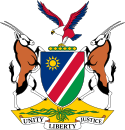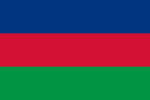 |
|---|
The South West Africa People's Organisation (/ˈswɑːpoʊ/, SWAPO; Afrikaans: Suidwes-Afrikaanse Volks Organisasie, SWAVO; German: Südwestafrikanische Volksorganisation, SWAVO), officially known as the SWAPO Party of Namibia, is a political party and former independence movement in Namibia (formerly South West Africa). Founded in 1960, it has been the governing party in Namibia since the country achieved independence in 1990. The party continues to be dominated in number and influence by the Ovambo ethnic group.
SWAPO held a two-thirds majority in parliament from 1994 to 2019. In the general election held in November 2019, the party won 65.5% of the popular vote and 63 out of the 104 seats in the National Assembly. It also holds 28 out of the 42 seats in the National Council. From November 2017 until his death in February 2024, Namibian President Hage Geingob remained the president of SWAPO after being elected to the position at the party's electoral congress.[9]
- ^ "Socialism with Namibian characteristics". Namibian Sun. 17 January 2019. Retrieved 16 April 2020.
- ^ "Will Swapo's Socialism Come to 'Mixed Economy' Namibia?". The Namibian. Retrieved 16 April 2020.
- ^ Iileka, Sakeus (9 November 2017). "Politburo approves sweeping changes". The Namibian. p. 1. Archived from the original on 12 November 2017. Retrieved 11 November 2017.
- ^ a b Tötemeyer, Gerhard (December 2007). "The Management of a Dominant Political Party system with particular reference to Namibia" (PDF). Friedrich Ebert Stiftung. p. 3. Archived (PDF) from the original on 14 February 2012. Retrieved 20 November 2019.
- ^ Dauth, Timothy (17 January 1995). "From Liberation Organisations to Ruling Parties: The ANC and SWAPO in Transition". NamNet Digest, Vol. 95, no. 3. Retrieved 9 June 2011.
- ^ Seibeb, Henny (12 May 2017). "Social Movements, Party Politics And Democracy In Namibia". The Namibian. Retrieved 12 October 2017.
- ^ Zollmann, Jakob (2021). Socialismes en Afrique. 54. Éditions de la Maison des sciences de l’homme. pp. 593–612. ISBN 9782735126996.
- ^ Soiri, Iina (May 1996). The Radical Motherhood: Namibian Women's Independence Struggle. Nordiska Afrikainstitutet Research Report, No 99. Uppsala: Nordiska Afrikainstitutet. ISBN 9789171063809.
- ^ "Namibia's President Geingob elected leader of ruling SWAPO party". Africanews. n.d.

